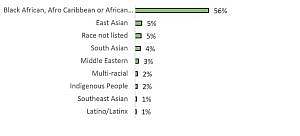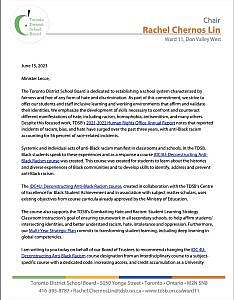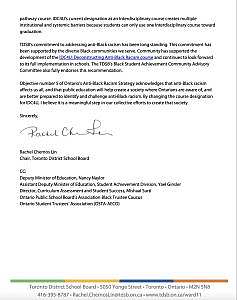Final grade, F: a teacher’s evaluation of Minister Lecce’s ‘Plan to Strengthen Black History Learning’
Did you know that in this country, Canada, Black folx were enslaved longer than we have been free? The sad but true reality is 206 years of colonial brutality and enslavement beginning in 1628, compared to 190 years of legal “freedom” beginning in 1834. Political, social, economic, and educational freedom remain side projects we continue to work toward in an ongoing effort to achieve true liberation for our communities, and those of all others on this land.
Indeed, ‘Black History IS Canadian History’, even when we don’t wish it to be.
Growing up in Ontario’s school system, I didn’t learn this; I didn’t learn about the reality of a ‘stolen people, on stolen land’ in school. As a young person, it would have been helpful to know about this dark, colonial, patriarchal, capitalist past. Understanding the inhumanity of it all would have helped me to understand the continued injustice that I saw growing up.
Coming up in the 80s and 90s in this city, born to a Black, American preacher’s son, and a White, Canadian, policeman’s daughter, I needed more discussions of identity, race, and racism in my school experience, to protect me from the countless ways they would disrupt my learning. I certainly needed more than the oft-repeated story of Canada as the “North Star”; the land of freedom, the haven for a post-racial society. I needed to know my history didn’t begin in some of the darkest days. And I needed not to be told half-truths.
As we await the 2025 rollout of Minister Lecce’s “Plan to Strengthen Black History Learning”, the stakes are high. As expected, post-Covid returns to in-class schooling have come with learning gaps. Additionally, there is a concerning and disproportionate reality for Black youth: in the TDSB, for example, the ‘21-’22 Human Rights Reports cites anti-Black racism as accounting for 56% of reported incidents of racism. Next is anti-East Asian racism at 5%.

Having reviewed Minister Lecce’s news release, this educator gives the preliminary plan an ‘F’, or ‘below Level 1’ as far as Ontario assessment and evaluation protocols are concerned.
It does not move the needle in ways that it needs to. It does not heed the longstanding calls for an equitable and transformational change in education. It does not even begin to address the magnitude of the prevalence and disparity of anti-Black racism and how it impacts Black youth in schools.
Before I critique the ‘just-in-time-for-Black-history month’, special announcement of a 30-something, white, Minister of Education (without any teaching experience) for work he has received, revised and edited to fit his view of what Black communities need, let me acknowledge the Black Excellence and efforts of Black Communities, in bringing us to this point.
Contrary to Minister Lecce’s communication team, this work is community work – a truly communal and collective Africentric effort in the spirit of Ujima. It is NOT the collective brain-child of Minister Lecce and a few Black Tory MPPs who’ve lost their way, but somehow “partnered to enhance Black history”, conveniently during Black History Month.
So sorry, but I call BS.
This is politics as usual, with the same uninspiring ‘leadership’ that also brings forward record lows in political engagement.
While Lecce’s overall plan misses the mark, before his edits, it is based on the very sound and courageous work of countless Black people, over many years, operating under a long tradition of counter-narrative and liberatory practices; they are staff in the Ministry of Education who have researched, advocated, and written the original plan; they are parents who seek better for their kids; they are educators who seek an informed and multicentric future (beyond the Eurocentric status-quo in education); they are community organizers who seek change through capacity building; they are trustees who bring our voices into political spaces; they are student trustees who optimistically bring ideas, hopes, and dreams forward; they are non-profit antiracism advocates who seek to disrupt systems; they are scholars who expertly document and interpret the facts; they are elders who guide us with wisdom; and they are our ancestors whose memory and struggle are not lost, but held close, and whose sacrifices continue to give strength and inspire our resilience.
These are Black folx, whose collective efforts against oppression bring us to this point; they are behind the scenes, in-front of the scenes, and have built the proverbial ‘scenes’. In fact, this work has become a foundation for other liberatory movements throughout the world.
Minister Lecce’s failure to see and honour this deep work, is akin to his university days as a political science and history student who failed to see the historical relevance of his participation in a “slave auction event”. Today, as in his younger years, he fails to see the full picture.
The report card
The GOOD:
The acknowledgement that “Black history IS Canadian history.” While many of our American counterparts wrestle with states banning of books and not seeing the past as directly related to the present and future, Lecce’s plan rightfully amplifies the language of Black historians like Natasha Henry, formerly head of the Ontario Black History Society, whose leadership and #BlackedOutHistory campaign effectively highlighted the omission of Blackness in Canadian history education.
Another positive is that the curricular strands will be informed and written by Black community, historians, scholars and educators. This is an important step. For far too long, Blackness has been seen through a Eurocentric and deficit perspective. It is important that ideas around Black identity come forward from positive, counter-narratives of Blackness.
The BAD:
With the 2025 changes to be in grades 7, 8, & 10, the Minister’s plan is out of step with the research in this space, which widely points to racism developing in early childhood, certainly many years before grade 7. As a parent, Black parent advisory committee member, educator, curriculum writer and contributor to the TDSB’s Anti-Hate & Anti-Racism strategy, I know first hand that parents of Black children across this province cannot wait until grade 7 for their child’s Blackness to be affirmed, and others’ views of anti-Blackness to be unlearned. If the problem begins at 3, the learning should begin at 3, in age appropriate ways, in the places we all gather: schools.
The UGLY:
In June of 2023, the Toronto District School Board’s Trustees unanimously passed a motion, 25-0, resulting in a letter to the Minister of Education recommending that the province make ‘Deconstructing Anti-Black Racism’, a grade 12, locally developed course, provincially accredited and offered to any secondary school wishing to run it.
Given that Ontario education is and has been Eurocentric since inception, the Centre of Excellence for Black Student Achievement collaborated in the course’s development. As a result, students often remark on the transformative nature of a course that centres Black identity, while offering Africentric wisdom and teachings to all, as opposed to the normative experience of having Blackness exist at the margins of Canadian society.
On June 15th, 2023, TDSB Chair, Rachel Chernos Lin, sent that letter to Minister of Education, Stephen Lecce.
That letter never received a response. A Its single, unanimous appeal from this, the largest board of education in the country, remains ignored. Unsurprisingly, the Minister’s announcement last week makes no mention of this leading, curricular work, vetted by Black scholars, and already running in multiple Boards of Education.
 \\
\\
The UGLIEST:
Black Community, and our allies, have been incredibly clear that a full provincial plan for schools to address racism and oppression in all their forms, requires a K-12 strategy, just as we have developed for numeracy, literacy, and numerous other disciplines. So why the difference here? A K-12 strategy is what has been called for. Why modify and reduce the ask to grade 7, 8, and 10?
Is affirming our children’s identities and helping them understand the adversities we and they will face, not every bit as important to kids as their proficiency in math? I submit to the Minister that, as a parent, my child’s respect for and sense of self is far more important to me than her mathematics. I can teach her math at home myself. At school, I need to know that her identity and those of all of her peers are being explored, appreciated, and celebrated. With that positive sense of self and her knowing that her teachers see and value her, she will take that confidence into math class and all other classes.
So sorry, Minister, but this is not the “real progress” you claim it to be, nor is it representative of what the Community has asked for.
The grade is an F.
However, I’d be happy to look at your resubmission.
Ashe,
d tyler robinson,
educator & curriculum writer
father, son, brother, partner, optimist, Scarberian, & human being


